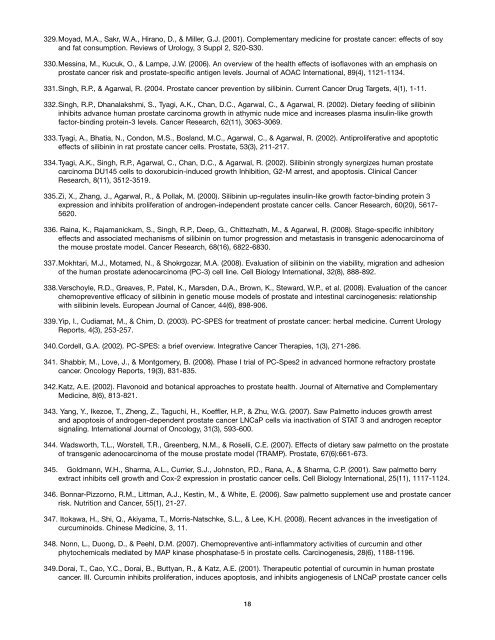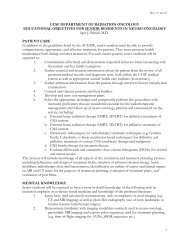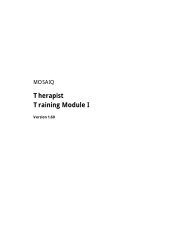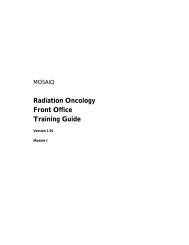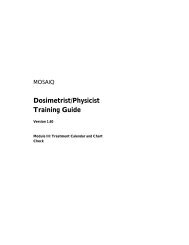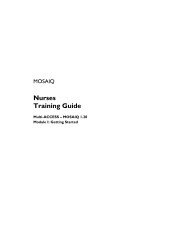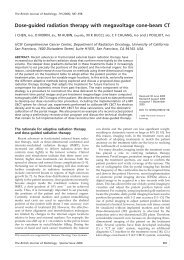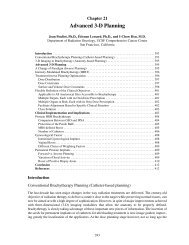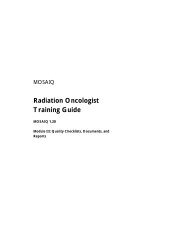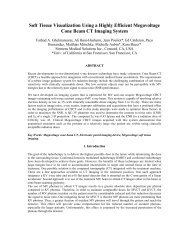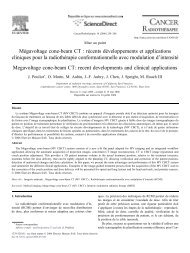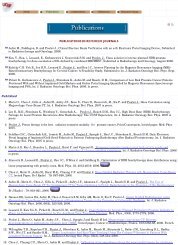Nutrition Prostate Cancer References - UCSF Radiation Oncology
Nutrition Prostate Cancer References - UCSF Radiation Oncology
Nutrition Prostate Cancer References - UCSF Radiation Oncology
Create successful ePaper yourself
Turn your PDF publications into a flip-book with our unique Google optimized e-Paper software.
329. Moyad, M.A., Sakr, W.A., Hirano, D., & Miller, G.J. (2001). Complementary medicine for prostate cancer: effects of soy<br />
and fat consumption. Reviews of Urology, 3 Suppl 2, S20-S30.<br />
330. Messina, M., Kucuk, O., & Lampe, J.W. (2006). An overview of the health effects of isoflavones with an emphasis on<br />
prostate cancer risk and prostate-specific antigen levels. Journal of AOAC International, 89(4), 1121-1134.<br />
331. Singh, R.P., & Agarwal, R. (2004. <strong>Prostate</strong> cancer prevention by silibinin. Current <strong>Cancer</strong> Drug Targets, 4(1), 1-11.<br />
332. Singh, R.P., Dhanalakshmi, S., Tyagi, A.K., Chan, D.C., Agarwal, C., & Agarwal, R. (2002). Dietary feeding of silibinin<br />
inhibits advance human prostate carcinoma growth in athymic nude mice and increases plasma insulin-like growth<br />
factor-binding protein-3 levels. <strong>Cancer</strong> Research, 62(11), 3063-3069.<br />
333. Tyagi, A., Bhatia, N., Condon, M.S., Bosland, M.C., Agarwal, C., & Agarwal, R. (2002). Antiproliferative and apoptotic<br />
effects of silibinin in rat prostate cancer cells. <strong>Prostate</strong>, 53(3), 211-217.<br />
334. Tyagi, A.K., Singh, R.P., Agarwal, C., Chan, D.C., & Agarwal, R. (2002). Silibinin strongly synergizes human prostate<br />
carcinoma DU145 cells to doxorubicin-induced growth Inhibition, G2-M arrest, and apoptosis. Clinical <strong>Cancer</strong><br />
Research, 8(11), 3512-3519.<br />
335. Zi, X., Zhang, J., Agarwal, R., & Pollak, M. (2000). Silibinin up-regulates insulin-like growth factor-binding protein 3<br />
expression and inhibits proliferation of androgen-independent prostate cancer cells. <strong>Cancer</strong> Research, 60(20), 5617-<br />
5620.<br />
336. Raina, K., Rajamanickam, S., Singh, R.P., Deep, G., Chittezhath, M., & Agarwal, R. (2008). Stage-specific inhibitory<br />
effects and associated mechanisms of silibinin on tumor progression and metastasis in transgenic adenocarcinoma of<br />
the mouse prostate model. <strong>Cancer</strong> Research, 68(16), 6822-6830.<br />
337. Mokhtari, M.J., Motamed, N., & Shokrgozar, M.A. (2008). Evaluation of silibinin on the viability, migration and adhesion<br />
of the human prostate adenocarcinoma (PC-3) cell line. Cell Biology International, 32(8), 888-892.<br />
338. Verschoyle, R.D., Greaves, P., Patel, K., Marsden, D.A., Brown, K., Steward, W.P., et al. (2008). Evaluation of the cancer<br />
chemopreventive efficacy of silibinin in genetic mouse models of prostate and intestinal carcinogenesis: relationship<br />
with silibinin levels. European Journal of <strong>Cancer</strong>, 44(6), 898-906.<br />
339. Yip, I., Cudiamat, M., & Chim, D. (2003). PC-SPES for treatment of prostate cancer: herbal medicine. Current Urology<br />
Reports, 4(3), 253-257.<br />
340. Cordell, G.A. (2002). PC-SPES: a brief overview. Integrative <strong>Cancer</strong> Therapies, 1(3), 271-286.<br />
341. Shabbir, M., Love, J., & Montgomery, B. (2008). Phase I trial of PC-Spes2 in advanced hormone refractory prostate<br />
cancer. <strong>Oncology</strong> Reports, 19(3), 831-835.<br />
342. Katz, A.E. (2002). Flavonoid and botanical approaches to prostate health. Journal of Alternative and Complementary<br />
Medicine, 8(6), 813-821.<br />
343. Yang, Y., Ikezoe, T., Zheng, Z., Taguchi, H., Koeffler, H.P., & Zhu, W.G. (2007). Saw Palmetto induces growth arrest<br />
and apoptosis of androgen-dependent prostate cancer LNCaP cells via inactivation of STAT 3 and androgen receptor<br />
signaling. International Journal of <strong>Oncology</strong>, 31(3), 593-600.<br />
344. Wadsworth, T.L., Worstell, T.R., Greenberg, N.M., & Roselli, C.E. (2007). Effects of dietary saw palmetto on the prostate<br />
of transgenic adenocarcinoma of the mouse prostate model (TRAMP). <strong>Prostate</strong>, 67(6):661-673.<br />
345. Goldmann, W.H., Sharma, A.L., Currier, S.J., Johnston, P.D., Rana, A., & Sharma, C.P. (2001). Saw palmetto berry<br />
extract inhibits cell growth and Cox-2 expression in prostatic cancer cells. Cell Biology International, 25(11), 1117-1124.<br />
346. Bonnar-Pizzorno, R.M., Littman, A.J., Kestin, M., & White, E. (2006). Saw palmetto supplement use and prostate cancer<br />
risk. <strong>Nutrition</strong> and <strong>Cancer</strong>, 55(1), 21-27.<br />
347. Itokawa, H., Shi, Q., Akiyama, T., Morris-Natschke, S.L., & Lee, K.H. (2008). Recent advances in the investigation of<br />
curcuminoids. Chinese Medicine, 3, 11.<br />
348. Nonn, L., Duong, D., & Peehl, D.M. (2007). Chemopreventive anti-inflammatory activities of curcumin and other<br />
phytochemicals mediated by MAP kinase phosphatase-5 in prostate cells. Carcinogenesis, 28(6), 1188-1196.<br />
349. Dorai, T., Cao, Y.C., Dorai, B., Buttyan, R., & Katz, A.E. (2001). Therapeutic potential of curcumin in human prostate<br />
cancer. III. Curcumin inhibits proliferation, induces apoptosis, and inhibits angiogenesis of LNCaP prostate cancer cells<br />
18


